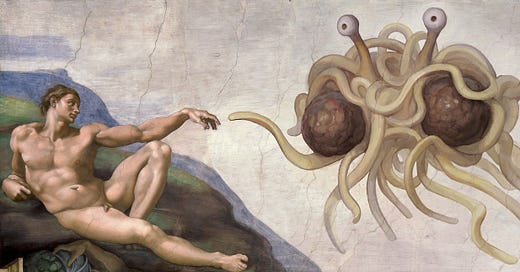This week in Biblical Ethics, we've been studying the First Commandment - considering God's Person and right in calling us to faithfulness as part of his covenant with us, as well as studying a few of the many gods (Asherah, Baal(s), Chemosh, Dagon, Marduk, Molech) that Old Testament cultures (including Israel) created instead.
After the Old Testament study, I then had my students get in groups and spend some time naming our gods today, coming up with a little history (as they understood it) of where the god came from, and listing a few requirements for each god's followers. I asked them to have fun with it (which they did), but they also made some insightful observations in the process. Here are just a few of my favorites:
Mart-Wal: this god was the first toy ever made; childish and mature, it believes toys are supreme, and requires the sacrifice of old toys and the purchase of new toys (every Tuesday); the more new toys you have, the greater your prosperity in heaven
Aquina: this is the goddess of vacation, worshiped by college students on spring break; she demands that all responsibilities be forgotten and followers behave in immoral ways; often depicted in a pink polka-dot bikini being anointed with tanning oil
Athletis: this god originated when the Spartans had an idea to play Ping-Pong with their enemies' eyes; essentially, everyone must play a sport or die, and that sport must have first priority over everything; motivating motto: "if you're not ripped, you suck"
iGod: this god started as a sundial and has progressed to artificial intelligence; worship includes a minimum of four hours in front of a screen and earbuds in all day long; followers are not allowed to have personal relationships with other people
Egoiste: this goddess of selfishness and greed was created in the Garden; she calls believers to desire what belongs to others, strive to gain an increasing number of possessions, and keep those possessions separate from others
The Almighty A: created at Plato's Academy in Greece, this god lives in the hallways of modern schools; minimum sacrifice to be offered is a 4.0 G.P.A., but complete atonement is not acknowledged until one makes a $150K salary and owns a Lexus
Timis Hasselus: this god of avoiding hassles has been around since the beginning of time; its laws require not getting too involved in anything and avoiding conflict at all costs; sacrament includes a repetitive checking of the watch
Gluttoness: this goddess thrives in the lives of depressed girls who eat when they're feeling down; followers must visit the Temple of the Golden Arches daily to take part in the sacraments, all of which must be deep-fried and super-sized
Sulfate: this god of pollution originated during the Industrial Revolution; believers must drive S.U.V.s and burn Styrofoam in their front yard to atone for their sins of recycling and thinking they are responsible for stewarding the planet
Cappucina: this goddess calls all followers to her table to bow down before her sacred beans; worshipers must have at least eight cups of overpriced coffee per day; caffeine headaches are to be embraced as due penance for disobedience
As follow-up to the assignment, one of my students sent me a news report out of Springfield, MO, about the Church of the Flying Spaghetti Monster. Sure, it's all tongue-in-cheek satire, but why are some Christians "involved" as the church's spokesman says they are? I don't get it.




